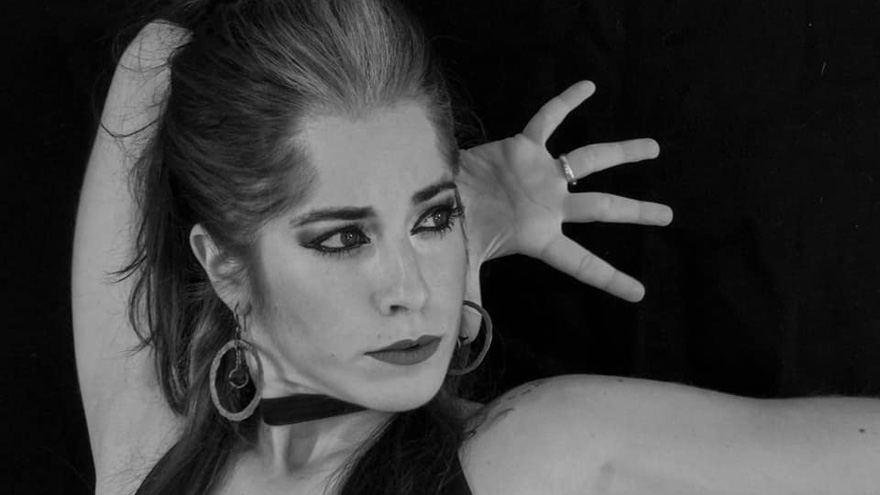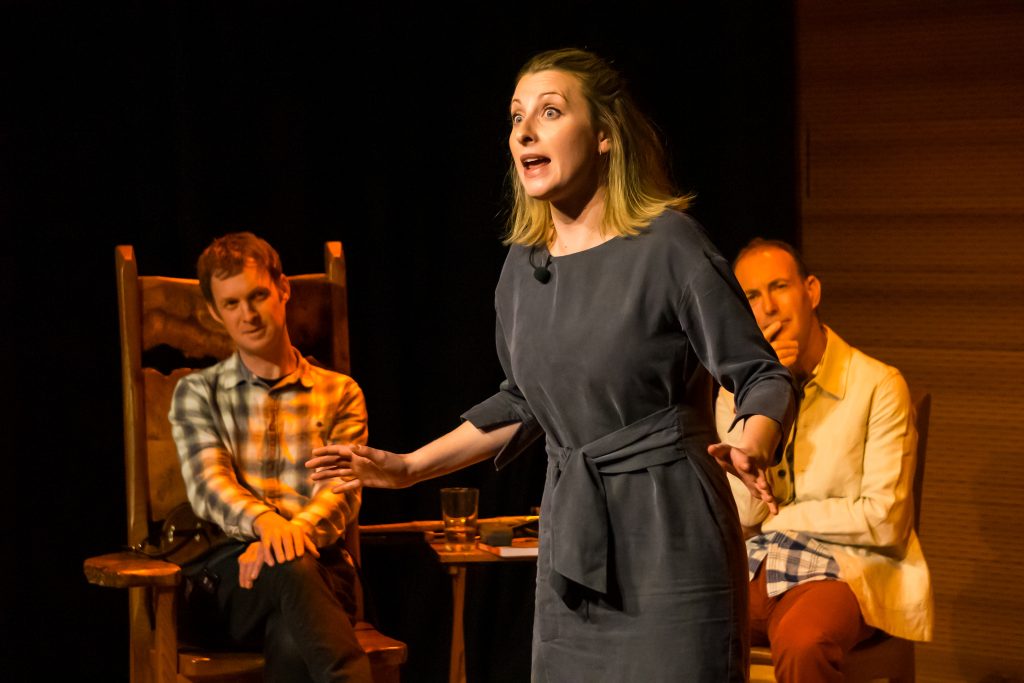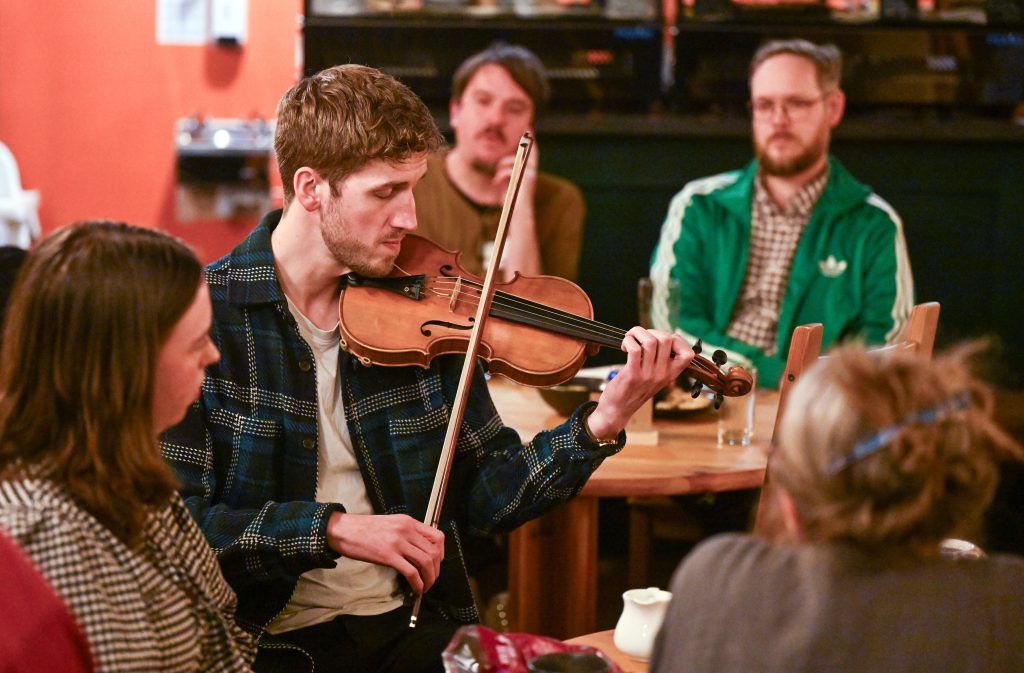This World Storytelling Day, Sat 20 March 2021 at 7.30pm, TRACS is hosting a European Ceilidh to reach out to our friends, celebrate and strengthen our connections across Europe. As Lorenzo, one of our participating storytellers, put it so beautifully “If our stories have no borders, why should we?”. Of course, a traditional Ceilidh includes not one but three artforms and we’re delighted to be sharing a smorgasbord of stories, song and dance, as we invite contributions from across Europe to take the floor.
We spoke to some of the performers who are taking part in this wonderful celebration and they’ve shared with us what it means to be European, how it influences their art and why they love a Ceilidh.
Dance

Being a European artist provides a network to learn from, experiment and share cultures with. I had the amazing experience in 2017, when I represented my country (Spain) at the Biennial of Young Creators of Europe and the Mediterranean as an awarded dance choreographer with my first solo project. It was here that I enjoyed music, theatre, video making, fashion design etc. and made many international connections that I could never have imagined before.
I am a professional Spanish and Flamenco dancer, but I am a really curious person. My style has a lot of influences as I trained in ballet, contemporary dance, music and I have a MA in Choreography too. But Scotland is my home now, so it is a bit difficult to not immerse yourself with this beautiful culture and dance to its music. The question I ask myself when I start something new that scares me, is: “Why not?”. Artists have the power of communication and sometimes you have to say the words that others are unable to.
My favourite thing about a Ceilidh is the smile that lingers on my face for days!
Storytelling

Lorenzo Caviglia
Being European has a big meaning to me and my art. In this time of rising nationalisms, it is ever so important to share art across the borders and tell each other’s stories: we might notice that we have a lot in common. Follow Jack across the Channel, across France, down to Italy and you’ll find that he is called Giovanni, but still gets into trouble with giants and men alike. If our stories have no borders, why should we? Following the trail of stories, it’s wonderful to experience the beautiful diversity that we represent.
I love a good Ceilidh – but truly, what Ceilidh is not a good Ceilidh? The stories, the songs, the jokes, the poetry being shared build such an exquisite sense of connection that one can only go home feeling blessed. As an Italian storyteller I feel I was lucky to encounter this tradition on my journey, and it has a special place in my heart. It reminds me of a country that I love, and of people I miss very much. The Ceilidh night at the Storytelling Centre makes me feel part of a wonderful network, as big as Europe and even bigger.

To me being European means to be Lithuanian and to have old roots that are interconnected with all other European cultures. To speak one of the oldest languages in the world – Lithuanian and yet to be able to tell stories in English, to understand Scottish and especially a Glasgow accent, is fascinating. To be European means not only common roots but shared experiences and building a future together. For me Europe is about being open to the differences and this thirst to travel, to know, to learn, to listen more.
We all share similar if not the same stories, just the faces and decorations are different. I tell Lithuanian tales that are unique although in so many ways similar to Scandinavian, Finish-Estonian, German, and Slavic (Belorussian, Polish, Ukrainian and Russian) tales. I’ve heard Scottish tales that have the same plot as Lithuanian ones. There is this tale of two sisters in love with the same man, the seal man – selkie, the man of the sea in Scotland, and in Lithuania it’s a man from the wild meadow’s mist, but the dramatic tension and outcomes are the same. Because I live in Scotland, I take beautiful Scottish tales to Lithuania and tell them in Lithuanian.
It’s fun, inclusive and social with lots of fantastic storytellers and great stories! Ceilidh could be a great metaphor for Europe.

As many things in the arts, being European is not something consciously present, and yet it is in every heartbeat of my work. The stories I tell are highly influenced by my ethics, my background and my experience. Being European is as present in my accent, influenced by a romance language, as it is in my sadness and acceptance of the privilege coming from a colonial past. It is a sense of connection, both culturally as well as physically. It is the magic of listening to the same stories with slightly different elements coming from places kilometres away understanding how they shaped us.
My storytelling is very strongly influenced by theatre. As a theatre practitioner and designer, I can’t help but seeing storytelling as a form of monologue. As a visual artist, I love bringing the visuals into storytelling, both through visual theatre as well as through vivid descriptions. I am strongly influenced by stories that reflect my passion for social justice, and more often than not I like making up stories and telling personal ones as well as finding traditional tales that still today resonate with contemporary audiences.
What I love the most about a Ceilidh is how participatory it is. When you arrive, everyone is anonymous, but as the event goes on, people keep standing up and sharing a piece of who they are. By the end you’ll have talked and listened to others, leaving with a deep sense of togetherness.
Music

I was very excited when I heard about the plans for an online European Ceilidh. It’s so interesting to experience other countries cultures and getting together in a ceilidh setting is the perfect way to do this.
I’m going to play a few of my own compositions on the whistle. The first one is called ‘The Squirrel Returns’ after a very cheeky squirrel that ate all the bird seed – upside down (!), and then I’ll go into one called ‘KPC’ which is named after Kinning Park Complex in Glasgow, who do all sorts of great things for the community.
Sat 20 March | 7.30pm (2hrs) | Zoom | Pay What You Can







